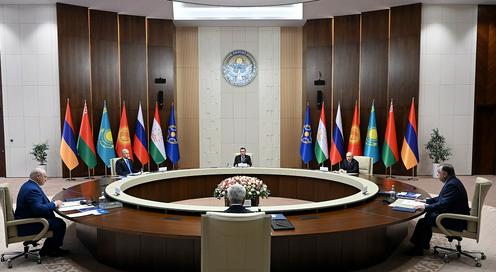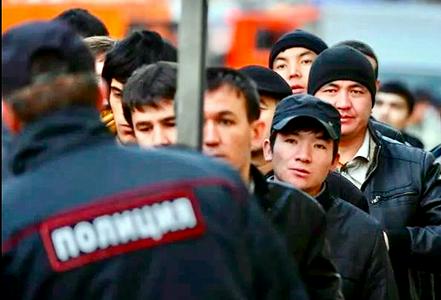 Photo from the press service of the president of Kyrgyzstan. Photo: Press service of the president of Kyrgyzstan.
Photo from the press service of the president of Kyrgyzstan. Photo: Press service of the president of Kyrgyzstan.
Speaking at the summit of the Collective Security Treaty Organization (CSTO) in Bishkek, Russian President Vladimir Putin proposed launching a large-scale program to equip the organization’s Collective Forces with modern Russian weapons and equipment that have proven effective in combat. His remarks were published by the Kremlin press service.
Against this backdrop, Putin said Russia plans to organize a series of joint training activities for military units and security services, referring to the next stages of the regular exercises “Interaction,” “Echelon,” and “Search.” He added that particular attention should be paid to developing aviation capabilities and air defense systems.
The president said Russia expects more effective work from the Coordination Council on Biosafety and will continue to support CSTO partners by sharing advances in military medicine.
Putin noted that Russia—set to assume the CSTO chairmanship after Kyrgyzstan—intends to begin preparing a new counterterrorism strategy.
“We will continue working with our partners in the organization to identify and eliminate international terrorist groups and their cells, and to cut off their financing channels,” he said.
Other priorities include strengthening information security and expanding cooperation on countering drug trafficking, including with international partners.
Kyrgyz President Sadyr Japarov, in his address at the summit, reviewed the organization’s activities during his country’s chairmanship. He said concrete steps were taken to address modern security challenges, and the CSTO’s international standing had been strengthened.
According to Japarov, in 2025 the CSTO implemented practical measures in military, military-economic, and military-technical cooperation and conducted several major exercises.
“These and other activities successfully ensured coordinated action among the armed forces of member states and improved their readiness to carry out assigned tasks,” he said.
Tajikistan’s President Emomali Rahmon described the international situation as “complex and difficult to predict” and stressed the importance of partnership within the CSTO. He welcomed the adoption of the organization’s Military Cooperation Development Plan and its Anti-Drug Strategy for 2026–2030. Rahmon also expressed hope for the timely implementation of the CSTO Intergovernmental Program to strengthen the Tajik-Afghan border.
Rahmon proposed establishing a CSTO Humanitarian Response Center in Tajikistan and emphasized the need for rapid information exchange and the development of new technologies—including artificial intelligence—in counterterrorism efforts.
At the summit in Bishkek, the role of CSTO Secretary General passed from Kazakhstan’s Imangali Tasmagambetov to Kyrgyzstan’s Taalaatbek Masadykov.
The summit concluded with the signing of a substantial package of documents, including the Declaration of the CSTO Collective Security Council; a resolution “On Measures to Shape a Positive Image of the CSTO and Its Member States in the Information Space”; and the CSTO budget for 2026.
The CSTO leaders’ summit and the meeting of the Collective Security Council took place on November 27 in Bishkek, with the participation of the presidents of Belarus (Alexander Lukashenko), Kazakhstan (Kassym-Jomart Tokayev), Kyrgyzstan (Sadyr Japarov), Russia (Vladimir Putin), and Tajikistan (Emomali Rahmon), as well as CSTO Secretary General Taalaatbek Masadykov.
The next summit is scheduled for November 11, 2026, in Moscow.
The CSTO is an international organization focused on strengthening peace and regional security. Its members are Russia, Belarus, Kazakhstan, Kyrgyzstan, and Tajikistan. Armenia formally remains a member, but has frozen its participation.









